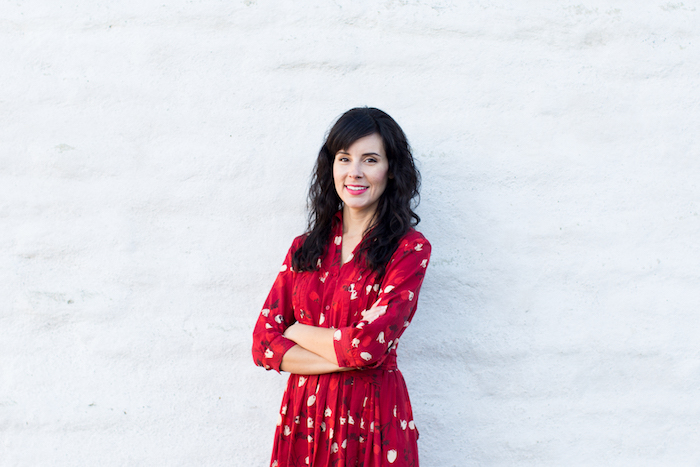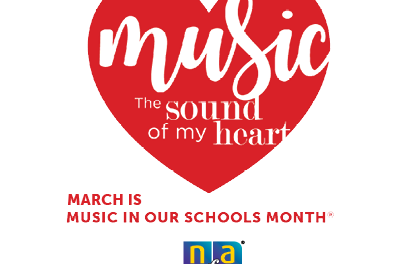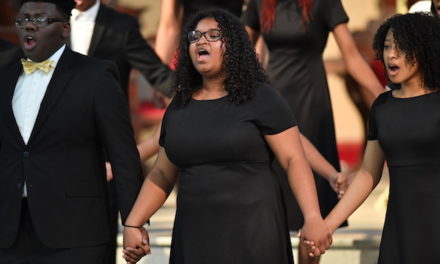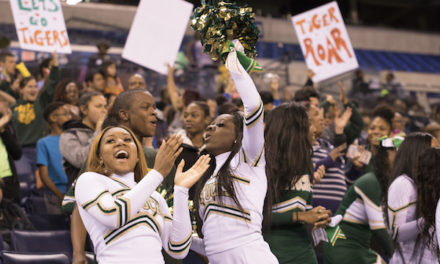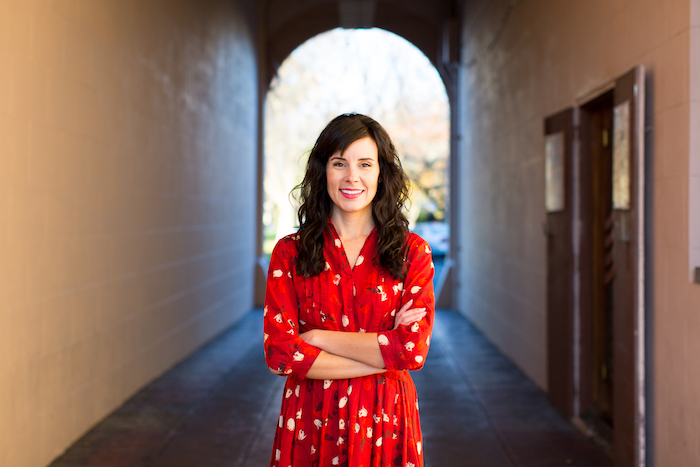
We know that students who participate in Music for All programming have positively life-changing experiences. Many of these students will eventually graduate high school and go on to fulfill life in variety of ways. Some will become engineers, teachers, medical professionals, artists, managers, and influential leaders in a wide range of fields. One former student has done just that, becoming the mayor of Sonoma, California. Native of Charleston, South Carolina, Rachel Hundley began her musical journey at six years old playing the piano. She went on to play the clarinet from middle school through her freshman year of college. Rachel participated in the Music for All National Festival with the Wando H.S. Symphonic Band in 1998.
Ms. Hundley went on to receive her undergraduate degree in political science, and speech and communications, at the University of Georgia, graduating summa cum laude. She eventually received her J.D. from the University of North Carolina School of Law, summa cum laude. After her time as an associate at the law firm of McDermott Will & Emery LLP in New York, she relocated to Northern California and pursued her passions of food and small businesses, and opened up a southern cuisine food truck and catering business with her business partner Arthur Chang. About a year later, wanting to immerse herself into the Sonoma community, Rachel Googled “how to run a campaign” and went on to win a seat on Sonoma’s city council. During that time, Hundley was able to invoke a program that provided “safe parking” for homeless people who lived in their cars. In 2016, when the time came to elect a new mayor, Hundley was chosen. Since being elected in office, Mayor Hundley participated in the Women’s March in Sonoma, and she hopes to inspire younger people to be involved in their communities. She was recently featured on Fortune.com and the Washington Post as a leader on the current political landscape.
Today, Mayor Hundley talks to us about the key role music has played in her life and how she developed into the political activist and leader she is today.
How did your participation in school music impact and shape the person you are today and what lessons did you learn from being in band?
As an adult, my two biggest strengths are critical thinking and creativity. Learning and playing music helps the brain develop reasoning skills, pattern recognition, intellectual curiosity, and creative thinking. By the time I started law school after college, my brain had almost two decades of preparation for a career based in logic and problem-solving.
Participating in school music programs also helped develop self-discipline. Being accountable to a group is a great motivator to practice at home. Whether it is working at home to prepare for a trial, building my business, or keeping myself informed about everything happening in my city, it takes a lot of self-motivation to stay on top of all of the responsibilities I have today. I learned a long time ago the importance of putting in the time and effort no one sees, so that I’m ready when it is time to shine.
Being in band for 13 years also helped develop my social and leadership skills. First I was a section leader. Then I was on the band leadership council. In college, I was president of my chapter of Sigma Alpha Iota, a professional music fraternity for women. Today I’m the mayor of my city. Learning how to lead and inspire takes practice, and developing those skills within the microcosm of my band program gave me a strong foundation for the leadership positions I’ve had later in life.
Also, music is fun! My most cherished memories and my closest friends all came out of school music programs in middle school and high school. Even though we are scattered across the country, I still keep in touch with many of my friends from band, who are all living extraordinary lives.
What are your enduring memories you have of being in your high school and middle school band?
My clarinet section was the center of my high school universe. When I was a freshman, I thought the seniors were awe-inspiring. So grown up and smart, and so talented! When my time came to lead the section, I thought it would be fun to give everyone a different tree name. Yes, trees. Willow. Pine. Magnolia, etc. I have no idea why I went with trees. The names stuck for the entire year. My best friends came out of that clarinet section, and we spent countless hours together sweating at band camp, nervously waiting to march out on the field during a competition, riding the bus to away games, even eating lunch together in the band room during the school day. I’m thankful band and my clarinet section was my anchor throughout middle and high school.
What instrument did you play in school, when did you start playing? Do you still make music?
I started playing piano when I was six years old. In 5th grade, I joined the orchestra and played violin. In 6th grade I switched to cello, while also joining band as a clarinetist at Laing Middle School, led by Miller Asbill. After a semester of trying to do both music programs, I decided to focus on band. My high school band at Wando High School in Mount Pleasant, South Carolina was led first by Miller Asbill and later Scott Rush. I played the clarinet for 13 years, including one year with the University of Georgia concert and marching bands. Eventually I had to give up band as an extracurricular because I had three majors (political science, journalism, and speech and communications), but I stayed involved in music through Sigma Alpha Iota and two chorus classes. In law school, three female classmates and I put together a rock cover band called “Attractive Nuisance.” Today, my schedule is too full for an organized group, but I do putter around on the piano and acoustic guitar every now and then.
What book did you most recently enjoy reading? What music are you listening to these days?
My brother, who played trombone in band, recently sent me a fascinating non-fiction book entitled, “If Mayors Ruled the World” by Benjamin R. Barber. Its premise is that local government is the most successful level of government because local leaders tend to focus on finding pragmatic solutions to the problems and issues at hand, rather than getting bogged down with partisan division. If the sewer needs to be fixed, then we better fix it.
Right now, my preferred genres of music are electronic (house) and hip hop (west coast).
What’s an interesting fact about you not many people know?
I have terrible stage fright. Recitals, auditions and solos always terrified me when I was a student, but I did them anyway. Running for office was a hilariously terrifying experience. Sometimes when I’d walk up to the podium to speak to a large group of people my knees would be shaking, and I’d silently curse myself for getting myself into the situation. After two years of sitting in front of large groups during televised city council meetings and now running those meetings, the nervousness has faded. I’m an introvert, and extemporaneous speaking is not my strong suit, but I’ve been forcing myself to perform and speak in front of audiences long enough to know that I’ll probably survive and the next time will probably be a little easier.
Anything else we should know or that you’d like to tell our school music student, teacher, and parent readers?
Thank you to all of the music teachers and supportive parents out there! Looking back, I can’t believe all of the time and energy all of the “grown-ups” put into supporting our various programs. I wouldn’t be the person I am today if it wasn’t for the music programs I had when I was in school. I’d also like to thank my two biggest fans who shuttled me back and forth to practice, and dutifully attended almost every concert I had: my parents.
